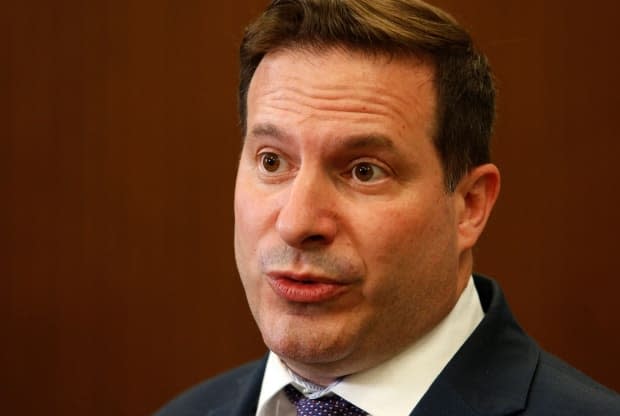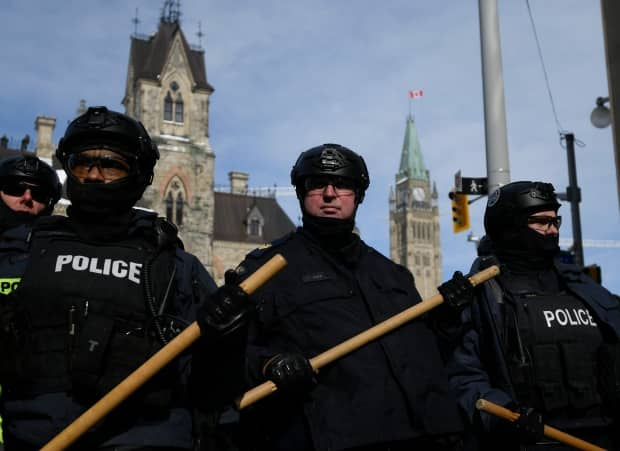Protests are coming back for Canada Day — and officials don't want a repeat of winter chaos

The federal public safety minister said he wants people to celebrate Canada Day, but with protests planned for the upcoming holiday weekend in Ottawa, Marco Mendicino says he's hoping the mistakes of last winter won't be repeated.
"I think Canadians should celebrate Canada Day. We've been through a marathon of the pandemic and there's reason for hope and optimism," he said in an interview last week.
"I do think it is troubling that some are fanning flames ... we don't want a replay of last winter and we don't want people engaging in illegal behaviour or violence that is disruptive to the community here in Ottawa or anywhere else."
Protest groups have said they plan to hold ongoing demonstrations throughout the summer, starting on June 30 and building toward Labour Day.
The Ottawa Police Service said it's aware of upcoming protests and is "planning accordingly."
The capital city's police force continues to face criticism about how it handled the anti-COVID-19 restriction protests last winter that gridlocked Ottawa for three weeks after protesters — some calling for the overthrow of the federal government — were able to park trucks and other vehicles on main arteries around Parliament Hill.
This week the sergeant-at-arms for the House of Commons said he was "flabbergasted" by police inaction at the time.
Protesters were eventually pushed out of the downtown core after the federal government took the never-before-used step of invoking the Emergencies Act. In the end, more than 100 people were arrested, leaving a multimillion-dollar policing bill.
"I think it's important that we take some lessons from last winter," Mendicino said.
"We'll continue to give [police] the tools and the support that is necessary to ensure that there's public safety as we celebrate Canada Day."
'We did what a responsible government would do'
Mendicino ended the spring sitting of Parliament, now on a summer hiatus, under intense questioning about how the decision to invoke the Emergencies Act was made.
The legislation authorized a ban on travel to protest zones, allowed banks to freeze the accounts of some of those involved in the protests and allowed officials to commandeer tow trucks. It also enabled the RCMP to enforce municipal bylaws and provincial offences as required.
The minister told a parliamentary committee investigating the issue that the government acted on "the advice of non-partisan professional law enforcement."

Under questioning, RCMP Commissioner Brenda Lucki and interim Ottawa police Chief Steve Bell testified that they did not ask the government to invoke the act, although they have said the new powers served as a deterrent.
Interim Conservative Leader Candice Bergen has called for Mendicino to resign, accusing him of "lying to and misleading Canadians about the Emergencies Act."
Mendicino said his government was talking to law enforcement daily, sometimes hourly.
"We did what a responsible government would do, which is remain in contact with law enforcement for the purposes of making the decisions that were necessary to restore public safety," he said.
At the time of invocation, Prime Minister Justin Trudeau argued its use was necessary to address "serious challenges to law enforcement's ability to effectively enforce the law."
But that reasoning has been questioned by the opposition and other critics, who have asked whether other measures, including policing tactics, could have been used.
Mendicino pointed to testimony from Lucki, who spoke about the ability to direct tow trucks to help move vehicles clogging Ottawa's streets.
"Other powers that were granted under the Emergencies Act were done with the benefit of the advice, which we proactively sought from law enforcement prior to invoking the Emergencies Act. That's the way the system is supposed to work," Mendicino said.
"It made enormous sense for the government to be in conversation with police, identifying where gaps in existing authorities lay, and then filling those gaps with unique, exceptional time-limited and targeted powers."
Mendicino added that Lucki has "corroborated that" in her testimony.
Independent inquiry to begin soon
Outside of the parliamentary committee, an independent inquiry will also soon begin digging into the reasons behind the decision to invoke the Emergencies Act for the first time.
"We hope we don't ever have to use those rare powers again," Mendicino said.
"But I'll never apologize for doing what is necessary to protect Canadians, and invoking the Emergencies Act was the right thing to do."

The upcoming protests are scheduled to kick off when James Topp, a veteran marching across Canada against vaccine mandates, plans to end his cross-country journey at the National War Memorial in downtown Ottawa.
Last week, the federal government lifted the vaccine mandate requirement for federal employees and for passengers wishing to board a plane or train in Canada.
Earlier this week, Topp and other organizers met with Conservative MPs near Parliament Hill, where he said the protest has become something bigger
"Their issue is not so much with mandates anymore, it's their satisfaction with the federal government," Topp said.
"There is a divide in this country I have never seen or experienced before — I've only ever seen it in a war zone."
Conservative MP Jeremy Patzer, who represents Cypress Hills-Grasslands in Saskatchewan, said politicians of all stripes should listen to what the group has to say.
"I'm not willing to demonize or accept this narrative that people that have views that other people don't agree with, that they should be demonized for holding those views," he told CBC.


